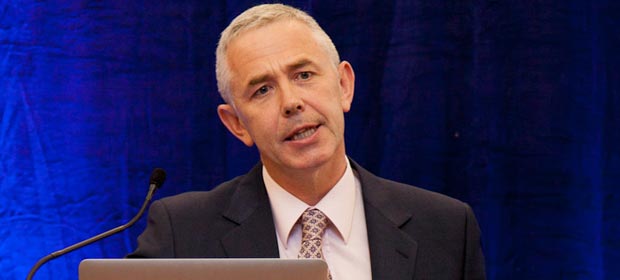The new hospital groups could utilise an Academic Healthcare Centre (AHC) model to provide overarching governance structures for the relationship between hospitals within the groups and their relationship to their primary academic partners, Prof. John R. Higgins, former Chair of the Strategic Board for the Establishment of Hospital Groups, told a meeting of the HMI South Region in the South Infirmary/Victoria University Hospital, Cork. Maureen Browne reports.

The new hospital groups could utilise an Academic Healthcare Centre (AHC) model to provide overarching governance structures for the relationship between hospitals within the groups and their relationship to their primary academic partners, Prof. John R. Higgins, former Chair of the Strategic Board for the Establishment of Hospital Groups, told a meeting of the HMI South Region in the South Infirmary/Victoria University Hospital, Cork.
He said that within the AHC model any proposed overarching board must meet the criteria outlined in the recommendations for interim group boards.
Prof. Higgins, who is Professor of Obstetrics and Gynaecology and Head of the College of Medicine and Health at UCC, was speaking on “The establishment of Hospital Groups as a transition to independent Hospital Trusts.”
He said the governance of Transitional Hospital Groups would be on a non-statutory basis, subject to formal evaluation. Interim Group Boards would consist of six to nine members, who would be nominated for appointment to the Minister by the Board Chairs. Board members would be skills based and would receive governance training. There would be no combination of the roles of Chair and CEO.
The Boards would report to the HSE or its successor and they would produce annual business plans.
Service provision would always have primacy. The Boards would report to the HSE or its successor and they would produce annual business plans. They would be subject to audit by the HSE, but there would be group flexibility re service delivery.
Prof. Higgins said the formation of hospital groups which would transition to independent hospital trusts would change how hospitals related to each other and integrated with the academic sector. Over time, they would deliver higher quality services, more consistent standards of care, more consistent access to care, stronger leadership and greater integration between the healthcare agenda and the teaching, training, research and innovation agenda.
The benefits for patients would be safe, high quality care, maximising locally delivered care, ensuring optimally skilled clinicians for the delivery of specialised complex care, ensuring integrated care pathways and patient choice.
The benefits for staff would be greater certainty accessing and providing services, multidisciplinary teams working across multiple sites, opportunities for staff, maintaining rotas, complying with the EWTD and forging academic linkage to the benefit of all grades and locations.
Hospital groups would mean safe equitable access to high quality care for the population consistent with the Small Hospitals Framework and the Clinical Programmes. There would be cooperation with other groups and the wider health services, staff appointments would be to the group and there would be deployment within the group.
Groups would be evaluated in advance of trust status, there would be cross border co-operation and quality improvement frameworks. Well functioning Hospital Groups would transition to Hospital Trusts.
Prof. Higgins said that the leadership posts would consist of a Chief Executive Officer, a Chief Clinical Director, a Chief Academic Officer, a Chief Director of Nursing, a Chief Finance Officer, a Chief Operations Officer and an International “Buddy.”
Management functions would be led by the CEO and management would be legally accountable to HSE or its successor. Individual hospital management teams would be dependent on the hospital size and range of services.
Individual hospital managers would be accountable to the group CEO, either directly in HSE hospitals or via the hospital board in voluntary and joint board hospitals.
Prof. Higgins said CEO recruitment would be by open international competition which would be run through the Public Appointments Service. (PAS) There would be a search and selection committee and the appointments would be for five years, subject to performance review by board
The role of Chief Executive Officer would be to lead the group, manage resources, assets and staffing levels, including recruitment, adhering to national and EU public procurement/competitive tendering requirements and initiatives, merging site specific services to reduce duplication and information sharing ICT communication within the group, with other groups and the wider health/social services.
Turning to the academic involvement, Prof. Higgins said there would be engagement on the tripartite mission of service, research and education. The primacy of the service would be imperative but “research, education and training were crucial for innovation that could sustainably improve service”.

